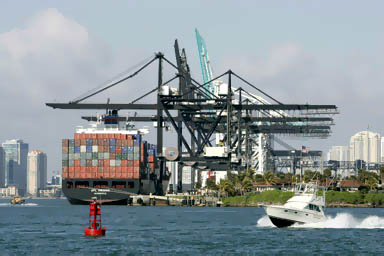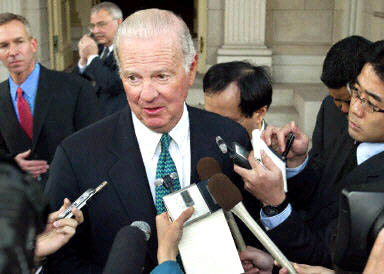
image above: Container ship at Dubai Ports World targeted operation in Florida
[Editor's
Note: The Carlyle Group is a supporteer right-wing political
actions thoughout the world and recently, through its subsidiary
Hawaiian Telecom,bought Verizon's operation of local phone
service in Hawaii, that serves Kauai]
More
incest than a village in Appalachia,
“…than a cocktail party
in Westport, Connecticut”
or “..than a dinner with the Saudi
Royal Family”
by shystee on 24 February 2006 at CorrenteWire.com
Via Randi Rhodes, the Goddess of Progressive Talk Radio. BTW:
Air America is a great way to keep up on things if you can’t
read blogs at work. But keep the volume down or you might
get questions from co-workers like “what is she bitching
about now?”.
The Lou Dobbs show, CNN, 22 February 2006:
CHRISTINE ROMANS, CNN CORRESPONDENT (voice over):
The
oil-rich United Arab Emirates is a major investor in The Carlyle
Group, the private equity investment firm where President
Bush’s father once served as senior adviser and is a
who’s who of former high-level government officials.
Just last year, Dubai International Capital, a government-backed
buyout firm, invested in an $8 billion Carlyle fund.
But there’s much more:
Another family connection, the president’s brother,
Neil Bush, has reportedly received funding for his educational
software company from the UAE investors. A call to his company
was not returned.
Snow: Who knew?
Then there is the cabinet connection. Treasury Secretary John
Snow was chairman of railroad company CSX/. After he left
the company for the White House, CSX sold its international
port operations to Dubai Ports World for more than a billion
dollars.
In Connecticut today, Snow told reporters he had no knowledge
of that CSX sale. “I learned of this transaction probably
the same way members of the Senate did, by reading about it
in the newspapers.”
It just doesn’t stop
Another administration connection, President Bush chose a
Dubai Ports World executive to head the U.S. Maritime Administration.
David Sanborn, the former director of Dubai Ports’ European
and Latin American operations, he was tapped just last month
to lead the agency that oversees U.S. port operations.
Conspiracy theory? Let’s follow the gagillions of dollars
and let the players speak for themselves:
December 2002 - February 2003:
Carlyle Group Purchases CSX Lines, LLC
CSX and The Carlyle Group Complete Conveyance of CSX Lines
Jacksonville, FL, and Washington, DC - CSX Corporation (NYSE:
CSX) and The Carlyle Group, a global private equity firm,
announced today that they have completed the conveyance of
CSX Lines, LLC, from CSX to a venture formed with The Carlyle
Group. CSX received $300 million, consisting of $240 million
in cash and $60 million of securities issued by the venture.
As part of the transaction announced December 17, 2002, former
CSX Lines President and CEO Charles G. (Chuck) Raymond and
his management team will lead the Charlotte, N.C.-based ocean
carrier, now named Horizon Lines, LLC.
- Carlyle Group Website/Press Release
January 2003:
Bush Nominates John Snow, Chairman and CEO of CSX to be Treasury
Secretary
President George W. Bush nominated John William Snow to be
the 73rd Secretary of the Treasury on January 13, 2003 . The
United States Senate unanimously confirmed Snow to the position
on January 30, 2003 and he was sworn into office on February
3, 2003 . As Secretary of the Treasury, Snow works closely
with President Bush on a broad array of economy policy issues.
Before coming to Treasury, Snow was Chairman and Chief Executive
Officer of CSX Corporation, where he successfully guided the
global transportation company through a period of tremendous
change.
- Treasury Dept. Website
December 2004:
DP (Dubai Ports) World announces agreement to purchase CSX’s
shipping terminals
December 2004:
DP World - International made it’s most ambitious move
to-date, with the announcement that it had signed a definitive
agreement with CSX Corporation to acquire the international
terminal business conducted by CSX World Terminals and other
related interests for a cash consideration of US$ 1.15bn,
completion of this transaction is expected to take place in
the first quarter of 2005.
The CSX World Terminals container terminal portfolio consists
of interests in 9 terminals with 24 berths and a combined
future capacity of 14.6 million TEU across operations in Asia,
Europe, Australia and Latin America.
- DP World Website
December 2005 - Early 2006:
DP World makes bid to purchase Peninsular and Oriental Steam
Navigation Company (“P&O”), a UK company that
operates some US ports. The increased recommended cash offer
is a revision to the terms of the original recommended proposals
in respect of the Deferred Stock (the “Revised Proposals”).
- DP World Press Release
To sum it all up, Lou Dobbs lays the smackdown on the Chimp:
DOBBS:
President Bush has put forth a challenge tonight that I simply
can’t ignore. The president yesterday said he wanted
those who are critical and questioning of this port deal to
“step up and explain why all of a sudden a Middle Eastern
company is held to a different standard than a Great British
company.”
Well, first of all, Mr. President, to equate any country to
your principal partner in the coalition ignores that special
relationship this country’s enjoyed with the United
Kingdom for decades and decades. This also is not just a British
company and an Arab company, as I think you well know.
Peninsula and Oriental Steam Navigation is a British privately
owned company. Dubai Ports World is a UAE government controlled
and owned company. You see the difference, of course.
And furthermore, the money used to fund the 9/11 attacks,
most of it, in fact, was sent to the hijackers through the
UAE banking system. In fact, two of the hijackers were originally
from the UAE.
The UAE stonewalled U.S. efforts to track al Qaeda bank accounts
after 9/11. In addition, the Emirates does not recognize Israel
as a sovereign state. And the UAE was a transfer point for
shipments of nuclear technology to Iran, North Korea and Libya.
And if those aren’t good enough reasons, I would just
suggest I’m at a complete loss to offer what might be
considered good reasons.
|

